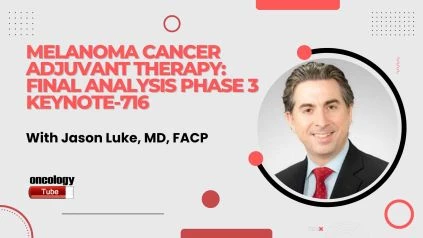Jason Luke, MD, FACP, a renowned medical professional affiliated with the University of Pittsburgh Medical Center (UPMC), recently conducted a comprehensive analysis of the phase 3 KEYNOTE-716 study, focusing on the comparison between pembrolizumab and placebo as adjuvant therapy in stage IIB or IIC melanoma patients.
The study’s final analysis examined distant metastasis-free survival, a crucial endpoint in evaluating the efficacy of adjuvant therapies.
Melanoma, a type of skin cancer, can progress to advanced stages, leading to distant metastasis and reduced survival rates. Adjuvant therapies aim to prevent or delay cancer recurrence after surgical removal of the primary tumor, potentially improving patient outcomes.
Pembrolizumab, an immune checkpoint inhibitor, has shown promising results in advanced melanoma, but its efficacy as an adjuvant therapy in earlier stages was not well-established.
The KEYNOTE-716 study enrolled patients diagnosed with stage IIB or IIC melanoma who had undergone complete surgical resection of their tumors. Participants were randomly assigned to receive either pembrolizumab or placebo as adjuvant therapy.
The primary endpoint of the study was distant metastasis-free survival, defined as the time from randomization to the first occurrence of distant metastasis or death from any cause.
The final analysis, led by Dr. Jason Luke, revealed significant improvements in distant metastasis-free survival among patients receiving pembrolizumab compared to those on placebo. The data demonstrated a clinically meaningful reduction in the risk of distant metastasis or death in the pembrolizumab group.
This finding suggests that pembrolizumab has a substantial impact on preventing the spread of melanoma beyond the initial site.
Furthermore, the study also assessed the overall survival and recurrence-free survival rates in both treatment arms. While the analysis for overall survival is still ongoing, preliminary results indicated a favorable trend for pembrolizumab-treated patients.
Recurrence-free survival, another secondary endpoint, showed promising results as well, with a lower risk of disease recurrence observed in the pembrolizumab group.
These findings have significant implications for clinical practice and patient care. The use of pembrolizumab as adjuvant therapy in stage IIB or IIC melanoma patients may substantially improve long-term outcomes by reducing the risk of distant metastasis and potentially extending overall survival.
It supports the growing body of evidence for immune checkpoint inhibitors as effective treatments across various stages of melanoma.
Dr. Jason Luke’s meticulous analysis of the KEYNOTE-716 study contributes valuable insights into the field of melanoma treatment and the use of pembrolizumab as an adjuvant therapy.
This research has the potential to revolutionize the standard of care for patients with earlier-stage melanoma, providing them with a promising therapeutic option that can significantly impact their prognosis and quality of life.

